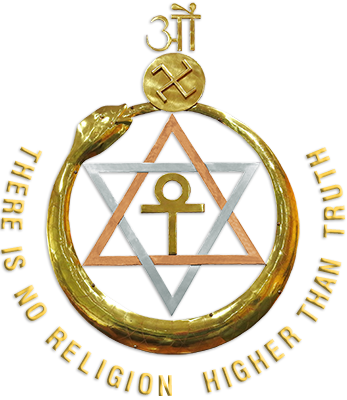Theosophy and The Theosophical Society
a movement formed in 1875 and ongoing
Formed in 1875 in New York, with international headquarters at Adyar, South India, the Theosophical Society has branches in around seventy countries throughout the world, the Australian Section dating back to 1895. The journalists and public intellectuals associated with the TS in its early days promoted the neglected philosophies of ancient Greece, Egypt, and India, arguing that they contained an unmatched metaphysics, psychology and ethic. It was partly to uncover and promulgate that “Wisdom-Religion” that the Theosophical Society was formed.
The Objects of the Society
These date back almost unchanged to the 19th century when in the face of scientific materialism, entrenched racism, superstition and dogmatic theology they were a truly radical statement.
- To form a nucleus of the Universal Brotherhood of Humanity, without distinction of race, creed, sex, caste or colour
- To encourage the study of comparative religion, philosophy and science
- To investigate unexplained laws of nature and the powers latent in the human being
What is Theosophy?
The word Theosophy is used in different ways. Within the Theosophical Society it is used mainly in two ways: to mean divine wisdom, from the Greek theosophia; and to mean a set of teachings on the subject of divine wisdom. As a system of thought by the name, Theosophy can be traced back to the third century, when Ammonius Saccas founded the Eclectic Theosophical System based on what came to be called Neo-Platonism.
- Belief in one absolute, incomprehensible and supreme Deity, or infinite essence, which is the root of all nature, and of all that is visible and invisible
- Belief in the human being’s immortal nature, identical in essence with the Universal Soul
- Theurgy, or divine work, which entails making oneself as pure as the incorporeal beings so that “the gods” might impart the Divine mysteries
These Neo-Platonic ideas were revived in works such as Isis Unveiled (1877) and The Secret Doctrine (1888), along with the idea that there once existed throughout the world a Wisdom-Religion known to all and especially the wise, such as the priests of ancient Egypt, the magi of Babylon and Persia, the ancient Greek philosophers and the sages of India. In this, Helena Blavatsky was in good company. The Renaissance Platonist Marsilio Ficino (1433-1499), the Cambridge Platonist Henry More (1614-1687) and Sir Isaac Newton (1642-1727), all subscribed to this notion, with Newton regarding himself more or less as a priest of this religion.
Freedom of Belief
While various authors and others associated with the Theosophical Society have strong beliefs of their own, the TS as an organisation has no beliefs. The Theosophical Society is a membership association. There is no one in the Society who has the right to speak on behalf of all the members, not even the International President. We are all students here, in one way or another. In fact, the Freedom of Thought Resolution is one of the features of the Society that is held most dear by many of its members.
Members of the TS are free to study what they wish, and many of them will never read The Secret Doctrine, the magnum opus of the principal founder of the Society to which they belong. There is no authority in the TS to say what should be read or practised, or even what is meant by Theosophy or Divine Wisdom, the object for which the Society was founded. Some members read widely and study deeply; some concentrate on specific areas of interest whether it be yoga, Buddhism, numerology or anything else. But many of them find it valuable and helpful to belong to an organisation in which one will invariably encounter thoughts of a different hue to one’s own, yet still infused with an interest in the deeper aspects of life that perhaps is rare to encounter in daily life.
As to the value of Blavatsky, Subba Row, Besant, Leadbeater and other authors published by Theosophical publishing houses, you will have to be the judge. They have remained in print for such a long time because generations of readers have benefited from their works. The insightful and progressive stance against dogmatic theology and materialistic science, the vindication of ancient philosophies including Hermeticism, and the argument that intelligence or consciousness came first, have stood the test of time. In the twentieth century, quantum physics, epigenetics, cardiology, neuroscience, morphogenetic field theory and consciousness research slowly but surely lent support to the key ideas promulgated by the Theosophical movement since inception.
The eclecticism and openness of the Theosophical Society may be challenging to some. There is no set teaching offered here, no single teacher to take one’s hand. Instead we are presented with the entire world of religion, philosophy and science — the sacred teachings of the ages—minus the compunction to believe or to follow.
H. P. Blavatsky, in The Key To Theosophy, wrote:
"If Eastern comparisons may be permitted, Theosophy is the shoreless ocean of universal truth, love, and wisdom, reflecting its radiance on the earth, while the Theosophical Society is only a visible bubble on that reflection. Theosophy is divine nature, visible and invisible, and its Society human nature trying to ascend to its divine parent. Theosophy, finally, is the fixed eternal sun, and its Society the evanescent comet trying to settle in an orbit to become a planet, ever revolving within the attraction of the sun of truth. It was formed to assist in showing to men and women that such a thing as Theosophy exists, and to help them to ascend towards it by studying and assimilating its eternal verities."
For further information please read on to the information in our section Leaflets & Booklets, as well as the many articles and books available on this site. Enjoy.




